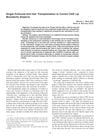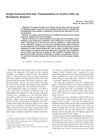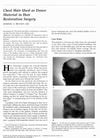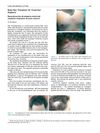Search
for
Sort by
Research
90-120 / 1000+ results
research Follicles First: The Importance of Follicular Transplantation in Beard Reconstruction
The authors suggest using scalp hair follicles for beard reconstruction to improve results and reduce surgery time and patient discomfort.

research Body Hair Transplant by Follicular Unit Extraction: My Experience With 122 Patients
Body hair transplantation is an effective method for restoring hair in people with severe baldness and limited scalp donor hair.

research Facial Hair in Hair Restoration Surgery
Beard restoration is important for creating masculine looks and using beard hair can increase scalp hair coverage.

research Changing Faces: Can a New Identity Stop Balding?
Changing hair follicle identity could potentially reverse balding.

research Single-Follicular-Unit Hair Transplantation to Correct Cleft Lip Moustache Alopecia
Hair transplant surgery successfully restored a boy's moustache hair on a cleft lip scar, with natural-looking results and patient satisfaction.

research Single-Follicular-Unit Hair Transplantation to Correct Cleft Lip Moustache Alopecia
Hair transplant surgery successfully restored a boy's moustache hair on a cleft lip scar, with natural-looking results and patient satisfaction.

research Hair Transplantation in East Asians
Hair transplantation in East Asians needs special techniques to ensure natural results and prevent complications due to their unique hair and scalp characteristics.
research Successful Hair Transplant Outcome in Cicatricial Lichen Planus of the Scalp by Combining Scalp and Beard Hair Along with Platelet Rich Plasma
Hair transplant combining scalp and beard hair with PRP was successful for scarring alopecia.

research Combining Scalp Micropigmentation and Hair Transplantation
Using scalp micropigmentation (a special tattoo technique) with hair transplantation can effectively treat hair loss, especially for those with low donor density or those unsuitable for only hair transplantation.

research From Surgery to Pharmacology to Gene Therapy: The Evolution of Hair Restoration Techniques
Hair restoration has evolved from surgery to drugs to potential gene therapy, with improved results and ongoing research driven by high demand.

research Investigation and Analysis of 1030 Primary Hair Transplantation Cases: A Retrospective Study
The study found that hair transplant complications are rare, with swelling being the most common issue.

research Does the Recipient Site Influence the Hair Growth Characteristics in Hair Transplantation?
The place where hair is transplanted can affect its growth and survival rates.

research Hair: A Review of Prominent Scalp Hair Changes Throughout a Female's Life
Women's hair gets thinner and grayer as they age, with treatments available for hair loss and graying.

research Does the Recipient Site Influence Hair Growth Characteristics in Hair Transplantation?
The recipient site can affect the growth and survival of transplanted hair but not its thickness.

research An Overview of Female Pattern Hair Loss
Female pattern hair loss involves thinning hair on crown and frontal scalp, diagnosed by hair ratio, and treated with minoxidil, antiandrogens, or hair transplantation.

research Chest Hair Used as Donor Material in Hair Restoration Surgery
Chest hair can be used for scalp hair transplants when there's not enough scalp hair.

research Body-Hair Transplant for Cicatricial Alopecia
Body-hair transplant successfully improved scarred areas and frontal hair density without visible chest scarring.

research Current Understanding and Treatment of Sex Hormone-Related Hair Diseases
Sex hormones affect hair growth and loss, and treatments for related hair diseases include various medications, hair transplantation, and light therapy.

research Follicular Unit Transplantation for the Treatment of Secondary Cicatricial Alopecia
Hair transplant surgery is a safe and effective way to treat hair loss from scarring in Chinese patients.

research Follicular Unit Transplantation for the Treatment of Secondary Cicatricial Alopecia
Follicular Unit Transplantation is an effective and safe treatment for hair loss due to scarring.

research The Latest Innovations in Hair Transplantation
New hair transplant methods offer more natural results and better graft survival, with ongoing research to increase donor hair options.

research Involvement of Scalp and Nails in Lupus Erythematosus
Lupus can affect the scalp and nails, often causing hair loss and nail damage, and needs early aggressive treatment to prevent permanent damage.

research Shaved Hairstyle Scalp Medical Tattooing Technique for Treatment of Advanced Male Pattern Baldness Patients
SMT effectively treats advanced baldness with high satisfaction.

research Safety Concerns When Using Novel Medications to Treat Alopecia
Consider benefits and risks of new alopecia treatments for safety.

research Hair Changes Due to Drugs
Some drugs can cause reversible hair loss, but certain chemotherapy drugs may lead to permanent hair loss; drugs can also change hair color and texture.

research Evolution of Techniques in Hair Transplantation: A 12-Year Perspective
Hair transplantation techniques have improved over 12 years, with follicular unit grafting providing more natural results and potential future advances in automation and genetics.

research Follicular Unit Hair Transplantation
Follicular Unit Transplantation is a precise hair restoration technique that requires careful planning and a skilled team, and Follicular Unit Extraction offers a less invasive option.

research Hair and Scalp Disorders in Ethnic Populations
Different hair care practices and conditions affect African American hair and scalp health, requiring specialized knowledge for treatment.

research Alterations in Hair Follicle Morphology and Hair Shaft Production After Follicular Unit Transplantation
Hair transplants can make hair follicles larger and hair shafts thicker.